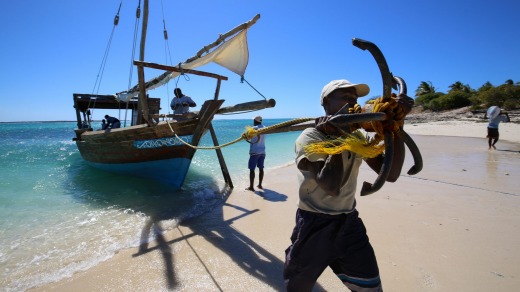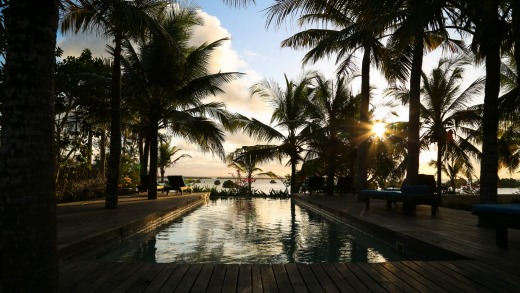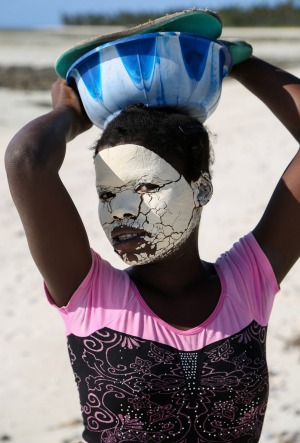Sailing on a wooden dhow, an Arabic design that has sailed the Indian Ocean for hundreds of years, is wonderfully rustic and more than comfortable.
Creaking wood, wind in the sail and the crisp sound of the boat slicing through the water are all I can hear. Gazing up at the blue sky, the canvas sail shades my face from the warm sun while the gentle rhythmic movement of the sea rocks me to a place of tranquil bliss. I'm on a traditional wooden dhow sailing to white-sand beaches in the Quirimbas Archipelago, a secluded tropical paradise in northern Mozambique. This place could be Africa's Whitsundays and a world away from the Australian winter.
The 12-metre wooden dhow, an Arabic design that has sailed the Indian Ocean for hundreds of years, is wonderfully rustic and more than comfortable. The mast is made from a less-than-straight tree trunk; the beam is lashed together with coconut husk rope. We sail on the Kusi southerlies, the same breeze favoured by the nomadic fishermen who ply these waters. Looking around I see the distinctive curved sails of other dhows in on the horizon; fishermen pulling lines through the aqua sea.
I'm on a dhow safari, a four-night island-hopping adventure run by Ibo Island Lodge. Historical Ibo Island is where the safari begins, reached by a scenic light-airplane flight over the archipelago from Pemba, the northern provincial capital; itself just a quick flight from Johannesburg.

Collected at Ibo Island by a modified open-topped Land Rover, you're at the lodge within minutes, being welcomed with cool hand towels and fresh juice. The ocean-facing lodge comprises three lovingly restored Portuguese villas. The fitout is classy colonial with whitewashed coral walls, antique wooden furniture and freshly cut bougainvillea flowers on every surface. This is luxury at its most elegant. The rooftop bar and restaurant overlooks the water facing west, the perfect place for sundowners. Three pools dot the lodge's manicured grounds.
The next day we depart on the dhow safari from Ibo Island's harbour. The dhow comes with a captain, first mate, chef, waiter and a professional English-speaking guide. The crew are cheery local sailors who could navigate these waters blindfolded.
I could have enjoyed sailing on the dhow all day but soon we were stopping at Matemo Island where we snorkel around the coral bommies that rim the island. Striped tiger fish hide under coral shelves while a thousand smaller colourful fish dart around the shallower parts. The water is clear and our guide takes us to the best spots. Afterwards, a small tinnie brings us to the beach, skilfully prodded along like a Venice gondola, where we wade the last hundred metres through the shallows. Our camp on the white-sand beach is just a few hundred metres from a camp of nomadic fishermen who sell our guide freshly caught octopus and leopard cod for lunch. The crew carries our luggage and all the camp equipment. Tents are already set up and chairs await us for gin and tonics with ice. This is "glamping" tropical island style, where dinner is served on a table in the sand with white tablecloths, chilled wine and beer and barbecued whole lobster.

The tents are standing-room canvas structures with comfortable stretcher beds and sheets. Don't expect claw-foot baths and LCD TVs found on some glitzy African safaris, the dhow safari is for travellers seeking a digital detox, a holiday from phones, emails, electricity and even mirrors. Where enjoying a minimalist beach lifestyle is the ultimate luxury. Here your day is dictated by the rise and fall of the sun and the stars, the winds and the tides. Where a private and warm beach shower at sunset washes away the salt and the sand, leaving you feeling like heaven.
After a cooked breakfast and a serve of tropical fruit, our guide takes us for a walk along the beach to meet the nomadic fishermen and to walk around the palm tree-shaded village, visiting the local primary school and drinking young coconuts picked straight from the tree.
Then it's time to read a book in the shade or take a dip in the sea. Or you can do nothing at all but watch locals walk along the beach carrying their seafood catch, the women's faces painted white to protect their skin from the sun.

We spend a second relaxing night on the island before setting sail on the dhow with the Kusi winds carrying us further north. A stop at a secluded island that's home to the mysterious coconut crab, supposedly the world's largest land crab and one strong enough to open coconuts. We didn't find any of the nocturnal creatures but the walk around the little coral island was stunning in itself.
Sailing even further north on the dhow we come to the pristine island of Mogundula, our final destination. Ibo Island Lodge has a semi-permanent camp here and we are its only inhabitants, save for a few elusive coconut crabs. The dhow pulls up directly onto a sandbank spit extending out from the island. It's also a perfectly sheltered swimming spot.
We use two-seater ocean kayaks to circumnavigate the small coral outcrop that is our home, stopping to dip in the deeper water pools here and there. Only our guide and a lone local fisherman in his colourfully painted dugout canoe shares the water.
From sunset we sit by the log fire high up on the beach and gaze at the clear Milky Way. Two nights here of reading books, drinking gin and tonics and swimming and strolling around the island is just enough time to thoroughly relax into the experience. Before we know it, it's time to up anchor and head back to Ibo Island accompanied briefly by a pod of dolphins. On this leg I close my eyes and sunbake on the dhow's second-storey cushioned sunroof. A seating area underneath provides shade and shelter.
Back at Ibo Island Lodge we enjoy a hot shower before a private, candle-lit dinner for two is set for us on the beach in front of the lodge. The skeleton of an old beached dhow is our only company. We select barbecued lobster and a bottle of good South African chenin blanc from the menu. The whole operation is so smooth it's easy to forget you're on a remote Mozambican island.
One of the luxuries of Ibo Island's experience is that all food is included in the cover price. This means you don't need foreign currency in your pockets, though you may want some if you take one of the complementary cultural or historical tours of Ibo Island. The once important Portuguese settlement, now a sleepy village, boasts a beautiful colonial town centre and historical sites.
Northern Mozambique is relatively untouched by tourism but that is changing with more and more travellers learning why the powder-white sand and aqua clear waters in these parts are are often called the most beautiful beaches in Africa. The archipelago however, protected by the Quirimbas National Park, is certainly still secluded enough to live out any Robinson Crusoe fantasies. Ibo Island Lodge offers packages of seven-night island hopping dhow safaris – three nights at the lodge, four nights on the dhow safari. Hire the whole dhow for a romantic special occasion or bring the family and friends.
mozambiquetourism.co.za
Australian-based African travel experts Bench International organise tailor-made tours to Ibo Island Lodge, Mozambique: see benchInternational.com.au
Ibo Island Lodge's dhow safaris, seeiboisland.com or contact: [email protected]